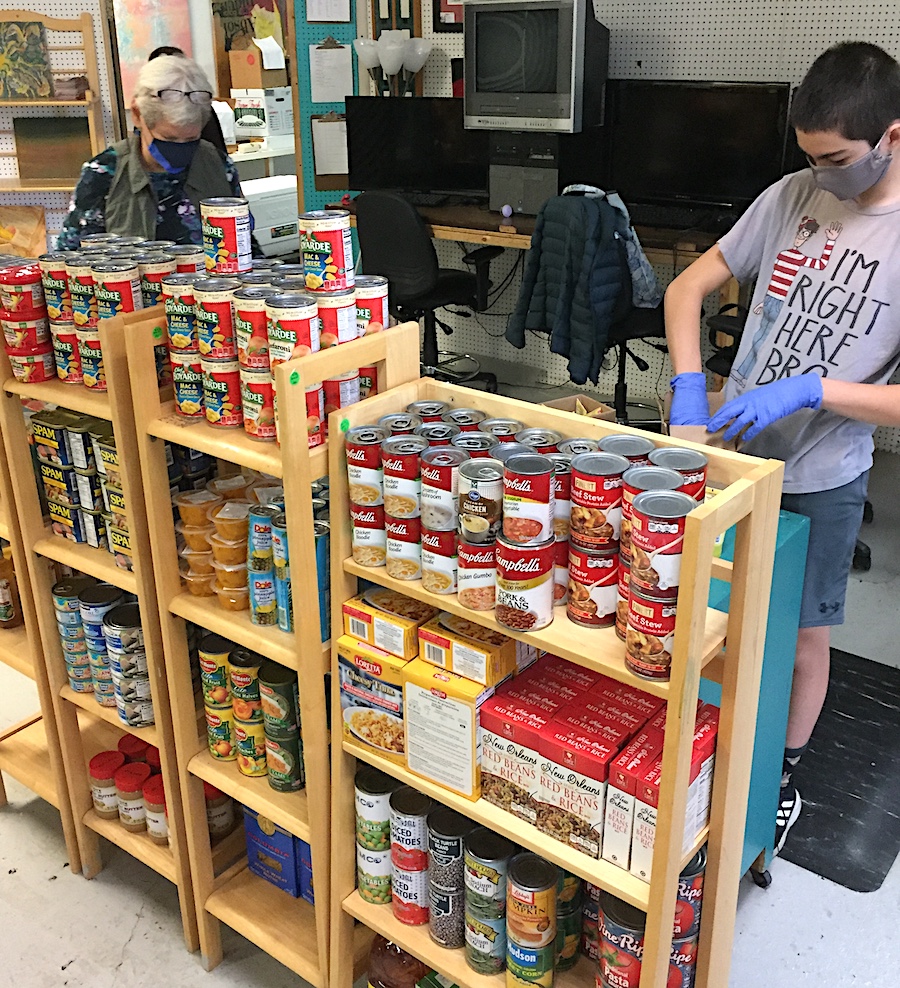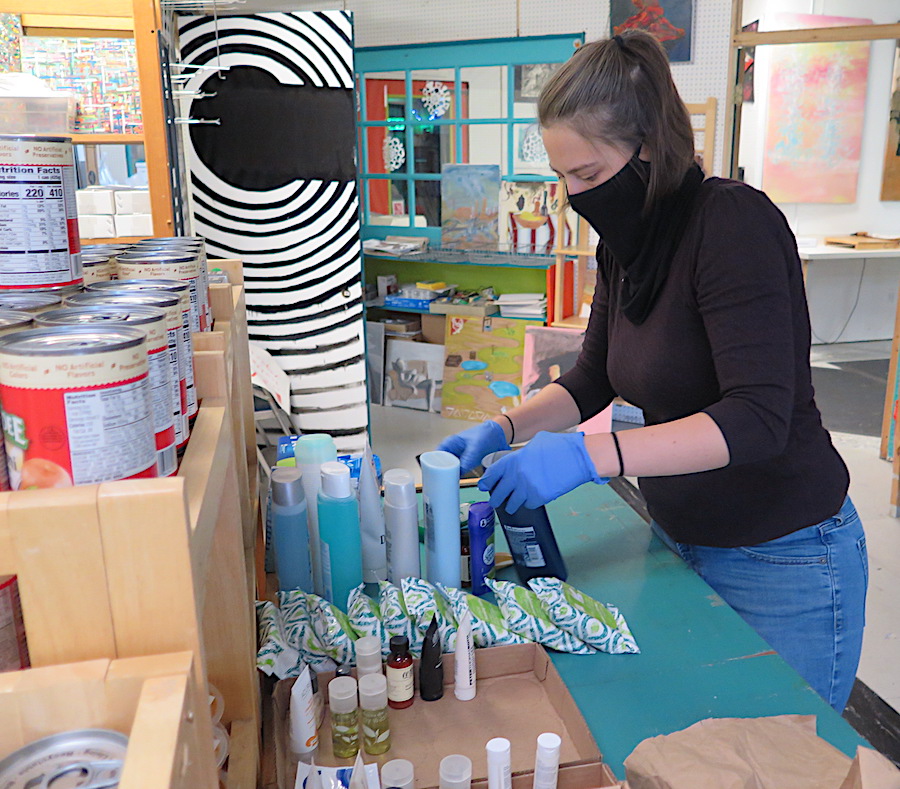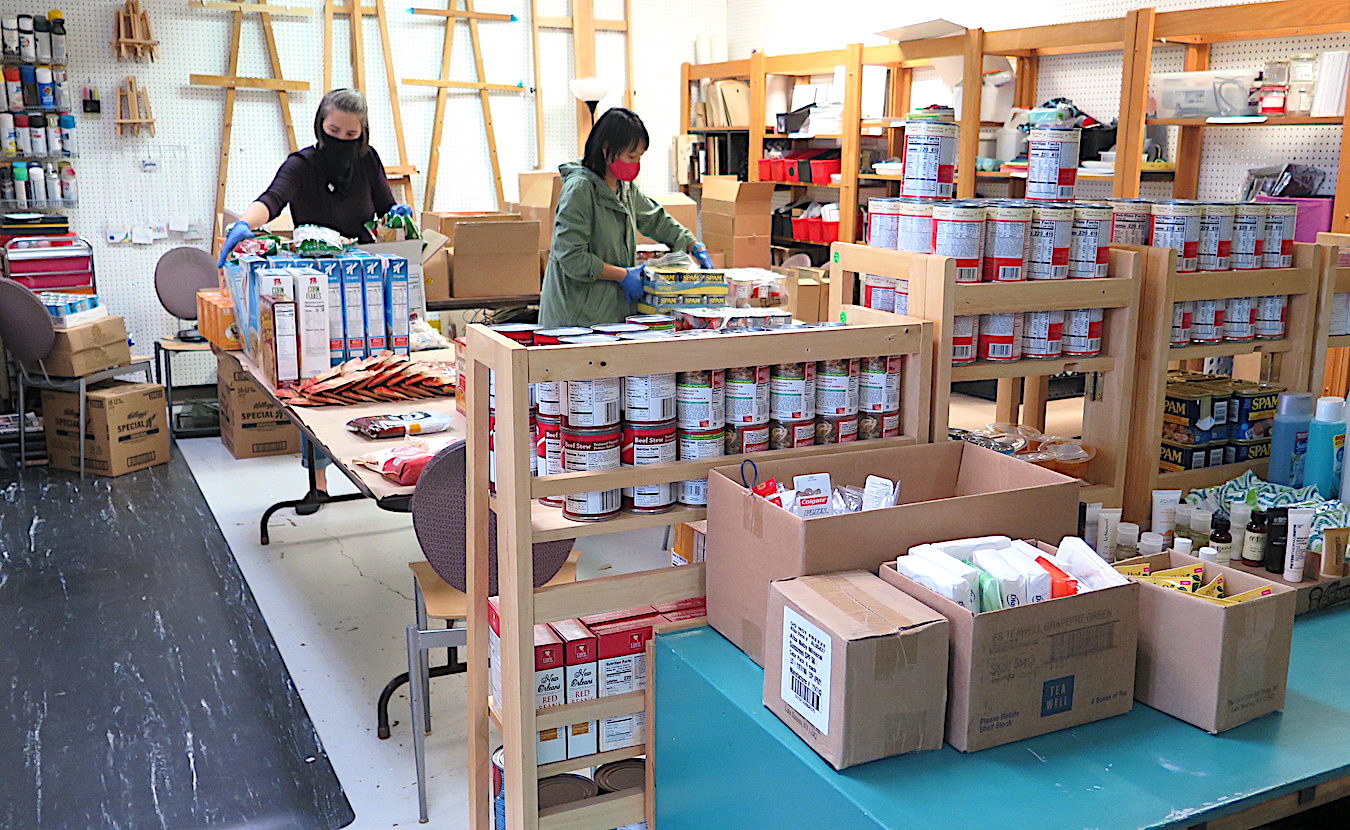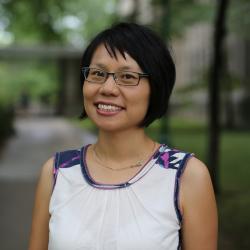What does it take to start up a food pantry in the middle of the COVID-19 pandemic? Angela Babb, a local food activist, has figured this out detail by detail over the past few months. With her at the helm, the People’s Open Pantry (“POP” or La Despensa POPular in Spanish) launched on September 19 in Bloomington.
POP currently runs every Saturday from 11 a.m. to 1 p.m. inside the M.A.D.E. classroom at Artisan Alley, a 501(c)3 nonprofit art co-op just off the B-Line Trail at 222 W. 2nd St. Pre-coronavirus, the mixed-use maker space buzzed with activity, but it has now suspended much of its regular programming for safety reasons. The pause unexpectedly but fortuitously left room for POP to set up shop.

People’s Open Pantry and the People’s Market CSA are open every Saturday from 11 a.m. to 1 p.m. at Artisan Alley, just off the B-Line Trail at 222 W. 2nd St. (CSA orders must be placed in advance. More details at the end of the article.) | Limestone Post
People’s Open Pantry is the newest initiative to unfold under the aegis of the People’s Market. The Market is the heart-, hand-, and brain-child of five farmers, four activists, three food business owners, and three scholars, about half of whom are BIPOC (Black/Indigeneous/People of Color). The group coalesced to build a safe, inclusive, and deliberately antiracist farmers market in January 2020. Their ambition was a pointed comeback to the controversial presence of “Identitarian” white supremacist vendors at the City of Bloomington’s Community Farmers’ Market. On March 21, just as Indiana locked down to contain the spread of COVID-19, the People’s Market debuted in the form of a Community Supported Agriculture (CSA) “drive-by” service at the vacant Kmart parking lot on East 3rd Street. After three and a half months of no-contact orders, People’s Market introduced on-the-ground operations on July 4, where customers can now purchase goods from sellers face-to-face.
“Access” is a key guiding principle for the People’s Market. As a member of the planning committee, Babb oversees its participation in the U.S. Department of Agriculture’s Supplemental Nutrition Assistance Program (SNAP). SNAP subsidizes “healthy food” for lower-income Americans. Since May, the People’s Market has offered a CSA “SNAP Match program” to double the value of SNAP benefits — essentially offering locally produced food at half-price to those who qualify. Babb runs the SNAP Match program out of Artisan Alley, which is the fiscal sponsor (i.e., the administrative “home”) for the People’s Market.
“The idea for POP came from Artisan Alley,” says Babb. “They had just become a member agency of Hoosier Hills Food Bank to provide food to kids during their after-school arts education program.” Hoosier Hills Food Bank (HHFB)is a regional nonprofit agency that collects and distributes food across several Indiana counties. Adam Nahas, Artisan Alley’s executive director, imagined an even bigger potential in this partnership. “Adam suggested that People’s Market apply to Hoosier Hills Food Bank to become a second Artisan Alley recipient of HHFB food,” Babb says. “I presented the idea to the People’s Market Planning Committee, and we immediately voted yes to move forward with opening POP.” She adds, “It was an easy decision, as this aligns with People’s Market’s values and mission to build equity and support community access to food.”

People’s Open Pantry offers a variety of fresh and canned foods, personal-care products, and even dairy and dairy substitutes from Hoosier Hills Food Bank. Donations are welcome. See end of article for drop-off locations and times. | Limestone Post
POP advances Artisan Alley’s collaboration and sustainability mission, Nahas says. “Artisan Alley is a charitable nonprofit and artisan cooperative in Bloomington that provides affordable resources such as workspaces, public events, educational classes, specialized tools, equipment, and opportunities for physical and fiscal support for the greater artisan community. Thanks to the People’s Market, we can now add a food pantry to that list.”
Once Babb got the green light from both Artisan Alley and the People’s Market, she submitted an application to Hoosier Hills Food Bank. She began working with HHFB Agency Relations Coordinator Erin Hollinden to develop POP. “Erin has been extremely helpful, providing resources from other food pantries so that we don’t have to recreate the wheels, so to speak,” says Babb. “The HHFB is primarily concerned about food safety and anti-discrimination, so we have had some food safety training, and we have worked on creating a welcoming and inclusive environment.” In the final weeks leading up to POP’s opening, Babb brainstormed with People’s Market volunteers to plan how to arrange the pantry space and traffic flow to complement the SNAP Match program distribution.
“We at Hoosier Hills Food Bank are happy to add the People’s Open Pantry to our family of over 100 member agencies in six counties,” says Hollinden. She notes POP’s standout features: “It’s helpful that they serve on Saturdays, as we often get calls on Friday afternoons from people seeking food. Few pantries are open then, and only one other HHFB-affiliated pantry serves on Saturdays or Sundays. Especially considering the People’s Open Pantry’s easy-to-access location, it’s nice to be able to refer people there.” POP sits along the B-line Trail near the South Walnut Street/Kroger bus stop and within close walking distance to Seminary Square Park and the Shalom Community Center, which serves people experiencing homelessness and poverty.
Hollinden shares striking reminders of the area’s continuing hunger emergency. “This is one of six new agencies in Monroe County that has joined our team since the pandemic began. HHFB is now distributing about 40 percent more food than we did in 2019, thanks in part to these new member agencies.”

Angela Babb led a team of volunteers over the summer to work out the details of starting a food pantry during the pandemic. People’s Open Pantry launched on September 19. | Limestone Post
To prepare for each Saturday, Babb and People’s Market volunteer Jana Pereau visit the Hoosier Hills warehouse to select goods to stock POP and transport them back to Artisan Alley. They hauled 187 pounds of food on the inaugural trip. Pereau has spent her summer helping with the SNAP CSA distribution alongside Babb. She was initially drawn to the People’s Market as “a way to assist with food security for the larger community.” POP expands this reach, says Pereau. “Since most of the pantries have moved to a CSA–style distribution system, our ability to offer ‘shopping’ with open display and selection may be an attractive option for people. We are also trying to find out from people what kind of things they would like to see and do our best to make those available.”
For Babb, something pleasantly unexpected has been “the high quality of food we’ve gotten from HHFB,” she says. “We have been able to get organic and minimally processed foods, which were requested by our CSA patrons. We are able to tell HHFB our preferences, and they have exceeded our expectations.”
Seven volunteers tackled opening day with improvisational spirit, making creative use of materials on hand. They taped up hand-lettered signage in English and Spanish. They repurposed small wooden shelves and lined them neatly with cans of SPAM, tuna, mixed vegetables, and tomatoes; squeezable pouches of fruit juice; boxes of herbal teas, rice, and beans; and bottles of apple cider vinegar. Snacks, cereals, and fresh fruits and vegetables filled three classroom tables. Several coolers contained yogurt, cheese, and butter. A cabinet top held toiletries (toothpaste, deodorant, beauty products, cloth masks, etc.) donated by community members.
About twenty patrons came through on opening day. Pereau says that it went smoothly. “I was happy to see that people had already heard about it and showed up to participate.” Babb agrees. “We had a great crew of volunteers and a decent flow of clients come through. We started developing our processes together and are excited to meet more people as word gets out that we exist.” To this end, POP organizers are promoting the pantry through flyers, social media posts, and word-of-mouth to supplement HHFB’s informational outreach on “Finding Food in Monroe County.”
M., a mother of two toddlers, is enthusiastic about POP’s offerings. “Just seeing this available is really uplifting to me,” she says. “You’re having a week you’re just not financially stable in general, when you come into here and suddenly there’s also a food pantry, not just the awesome CSA program. You’re just like, ‘Yes! I will get to eat a lot and well, not just eat the bare minimum.’” The draw for her is “things I would be really excited to give my kids,” like cottage cheese. “I never knew before having kids they would legit go through all of your food like so quick. I had no idea,” she laughs. “They eat dairy foods like it’s going out of style.”

Jana Pereau (left) works at the Pantry with another volunteer. Each week, Pereau and Babb transport goods they’ve selected from the Hoosier Hills Food Bank to stock the Pantry. They hauled 187 pounds of food on the inaugural trip. | Limestone Post
On a sober more note, M. reflects, “Having kids during COVID … you just start to feel like you’re on an island without any support. And when you show up to a place where there’s food that you can take home to them, you sort of feel like maybe this world still cares. I know that sounds so sad but it is a weird year, that’s the truth. Every time I come in here, I just feel like [People’s Market] wants everybody to eat well.”
Baker and food equity advocate Amy Roche, another visitor, connects POP’s operating model to mutual aid values. Because proof of identification is not required, “you can self-identify your need,” she says. “I think there’s a lot of really important dignity in that and I think it’s aligned with … the concept of mutual aid in which someone identifies their own need, and people respond directly to that need without asking questions about it. … Honestly, there’s a lot of integrity and incredible efficiency in that that is deeply satisfying to me both spiritually as well as functionally.” Plus, Roche adds, “it was pretty amazing to see really good vegan butter substitute today and fresh produce and organic items.”
Amid the flurry of the rollout, Babb expresses both gratitude and optimism for the collective effort. “I really appreciate our volunteers, the HHFB, Artisan Alley, and all the community members who have donated food and personal items to the pantry. We have a long winter ahead of us, and we will only make it through this together.” She takes inspiration from a call by Indian historian and journalist Vijay Prashad: “What we need right now is not social distancing per se, but ‘physical distancing and social solidarity.’”
[Editor’s Note: Ellen Wu has worked as a volunteer at the People’s Open Pantry.]
People’s Open Pantry
Saturdays 11 a.m.–1 p.m.
222 W. 2nd St. (in Artisan Alley)

Volunteer Amie Messer organizes goods at the People’s Open Pantry prior to opening on a recent Saturday morning. | Limestone Post
People’s Open Pantry Donation Wish List
—Socks, gloves, hats, scarves
—PPE (gloves, masks, hand sanitizer)
—Full/sample size toiletries (shampoos, lotion, body wash, toothpaste, toothbrushes, floss)
—Deodorant
—Toilet paper
—Paper towels
—Silverware/plasticware (biodegradable preferred please)
—Tampons and pads
—New, unopened beauty items
—Nonperishable food items
Drop Off Donations on Saturdays:
People’s Open Pantry, 222 W. 2nd St. (in Artisan Alley) 9:30 a.m.–1 p.m.
Market Welcome Table, 3220 E. 3rd St. (by Bloomingfoods East) 10 a.m.–1 p.m.
People’s Market
“On the ground” location
3220 East 3rd St. (by Bloomingfoods East)
October and November Hours: 10 a.m.–1 p.m.
The online store is open Mondays at 8:00 am and closes at 5:00 pm on Wednesdays.
Pick up boxes Saturday mornings from 11:00 a.m.–2:00 p.m. at 3220 E. 3rd St. (by Bloomingfoods East), exceptfor EBT Card Users, who pick up on Saturdays at 222 W. 2nd St. (in Artisan Alley) from 11:00 a.m.–1 p.m. Email peoplesmarket@artisanalley.com for the weekly discount code.


